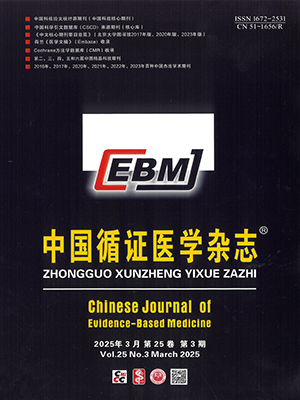| 1. |
庄铭, 安佳丽, 钟梦媛, 等. 中医药临床疗效评价方法研究进展. 中国中药杂志, 2023, 48(12): 3263-3268.
|
| 2. |
Kravitz RL, Duan N, Braslow J. Evidence-based medicine, heterogeneity of treatment effects, and the trouble with averages. Milbank Q, 2004, 82(4): 661-687.
|
| 3. |
Guyatt G, Sackett D, Taylor DW, et al. Determining optimal therapy--randomized trials in individual patients. N Engl J Med, 1986, 314(14): 889-892.
|
| 4. |
Duan N, Kravitz RL, Schmid CH. Single-patient (n-of-1) trials: a pragmatic clinical decision methodology for patient-centered comparative effectiveness research. J Clin Epidemiol, 2013, 66(8 Suppl): S21-S28.
|
| 5. |
张贺, 李秋忆, 樊懿萱, 等. 单病例随机对照试验在中医药临床研究中的探索与思考. 中西医结合心脑血管病杂志, 2020, 18(18): 2945-2947, 2954.
|
| 6. |
OCEBM Levels of Evidence Working Group. The Oxford levels of evidence 2. Oxford: Oxford Centre for Evidence-based Medicine.
|
| 7. |
王明莉, 王振伟, 陈新林, 等. 单病例试验的方法学比较和临床应用探索. 中国循证医学杂志, 2022, 22(4): 468-474.
|
| 8. |
陈绘佳, 王振伟, 张谊, 等. 针对“残留效应”混合效应模型的辨证论治方治疗支气管扩张症的单病例随机对照试验. 中国循证医学杂志, 2023, 23(5): 504-512.
|
| 9. |
成人支气管扩张症诊治专家共识编写组. 成人支气管扩张症诊治专家共识. 中华结核和呼吸杂志, 2012, 35(7): 485-492.
|
| 10. |
黄海茵, 杨佩兰, 汤杰, 等. 扶正化痰清热法治疗支气管扩张症46例远期疗效观察. 中医杂志, 2012, 53(10): 848-852.
|
| 11. |
中华中医药学会. 中医内科常见病诊疗指南中医病证部分. 北京: 中国中医药出版社, 2008.
|
| 12. |
李建生, 王至婉, 谢洋, 等. 支气管扩张症中医证候诊断标准(2019版). 中医杂志, 2020, 61(15): 1377-1380.
|
| 13. |
陈敏, 黄宁静, 王祎晟. 泻火止痛方治疗肝火上炎型偏头痛的临床研究. 中西医结合心脑血管病杂志, 2015, 13(12): 1375-1377.
|
| 14. |
Guyatt G, Rennie D. Users' guides to the medical literature: essentials of evidence-based clinical practice (2nd edition). Chicago: American Medical Association Press, 2002.
|
| 15. |
Guyatt GH, Keller JL, Jaeschke R, et al. The n-of-1 randomized controlled trial: clinical usefulness. Our three-year experience. Ann Intern Med, 1990, 112(4): 293-299.
|
| 16. |
Lee BY, Lee S, Lee JS, et al. Validity and reliability of CAT and dyspnea-12 in bronchiectasis and tuberculous destroyed lung. Tuberc Respir Dis (Seoul), 2012, 72(6): 467-474.
|
| 17. |
郑筱萸. 中药新药临床研究指导原则. 北京: 中国医药科技出版社, 2002.
|
| 18. |
Vohra S, Shamseer L, Sampson M, et al. CONSORT extension for reporting N-of-1 trials (CENT) 2015 statement. BMJ, 2015, 350: h1738.
|
| 19. |
Li J, Hu JY, Zhai JB, et al. CONSORT extension for reporting N-of-1 trials for traditional Chinese medicine (CENT for TCM): recommendations, explanation and elaboration. Complement Ther Med, 2019, 46: 180-188.
|
| 20. |
Lu L, An J, Chen H, et al. A series of n-of-1 trials for traditional Chinese medicine using a Bayesian method: study rationale and protocol. Evid Based Complement Alternat Med, 2021, 2021: 9976770.
|
| 21. |
Chen KW, Chow SC, Li G. A note on sample size determination for bioequivalence studies with high-order crossover designs. J Pharmacokinet Biopharm, 1997, 25(6): 753-765.
|
| 22. |
Bacchetti P, Leung JM. Sample size calculations in clinical research. Anesthesiology, 2002, 97(4): 1028-1029.
|
| 23. |
Porcino AJ, Shamseer L, Chan AW, et al. SPIRIT extension and elaboration for n-of-1 trials: SPENT 2019 checklist. BMJ, 2020, 368: m122.
|
| 24. |
Grieve AP, Senn S. Cross-over trials in clinical research. J R Sta So, 1994, 43(3): 469.
|
| 25. |
刘玉, 黄彬, 陈生, 等. 六味地黄胶囊治疗肝肾阴虚证疗效评价的例随机对照双盲试验. 中医杂志, 2018, 59(11): 947-951.
|
| 26. |
孙振球. 医学统计学(第4版). 北京: 人民卫生出版社, 2014.
|
| 27. |
Zucker DR, Ruthazer R, Schmid CH. Individual (N-of-1) trials can be combined to give population comparative treatment effect estimates: methodologic considerations. J Clin Epidemiol, 2010, 63(12): 1312-1323.
|
| 28. |
陈新林, 刘凤斌, 赵菲, 等. 探索适合中医药N-of-1试验的设计方案及模型. 广州中医药大学学报, 2018, 35(1): 172-175.
|
| 29. |
陈新林, 陈丽霞, 黄海茵, 等. 系列N-of-1试验定量数据混合效应模型的模拟研究. 中国循证医学杂志, 2021, 21(6): 689-695.
|
| 30. |
Nikles J, Mitchell G, McKinlay L, et al. A series of n-of-1 trials of stimulants in brain injured children. NeuroRehabilitation, 2017, 40(1): 11-21.
|
| 31. |
Stunnenberg BC, Raaphorst J, Groenewoud HM, et al. Effect of mexiletine on muscle stiffness in patients with nondystrophic myotonia evaluated using aggregated n-of-1 trials. JAMA, 2018, 320(22): 2344-2353.
|
| 32. |
Huang H, An J, Lu L, et al. Methodological considerations in n-of-1 trials of traditional Chinese medicine. Evid Based Complement Alternat Med, 2021, 2021: 6634134.
|
| 33. |
Yuhong H, Qian L, Yu L, et al. An n-of-1 trial service in clinical practice: testing the effectiveness of Liuwei Dihuang decoction for kidney-yin deficiency syndrome. Evid Based Complement Alternat Med, 2013, 2013: 827915.
|
| 34. |
Xie T, Yu Z. N-of-1 design and its applications to personalized treatment studies. Stat Biosci, 2017, 9(2): 662-675.
|
| 35. |
翟静波, 商洪才. 基于贝叶斯单病例试验的中医个体化疗效动态评价方法. 中国循证医学杂志, 2023, 23(11): 1334-1339.
|
| 36. |
张迪, 雒琳, 文天才, 等. 中医辨证论治疗效评价研究进展. 科技导报, 2023, 41(14): 32-41.
|
| 37. |
Huang H, Yang P, Wang J, et al. Investigation into the individualized treatment of traditional Chinese medicine through a series of N-of-1 trials. Evid Based Complement Alternat Med, 2018, 2018: 5813767.
|
| 38. |
Zi S, Huang H, Yang P, et al. Evaluating the effects of heat-clearing traditional Chinese medicine in stable bronchiectasis by a series of N-of-1 trials. Evid Based Complement Alternat Med, 2022, 2022: 6690638.
|
| 39. |
朱春胜, 聂安政, 王笑, 等. 中药量效关系的研究进展. 中草药, 2019, 50(7): 1708-1712.
|
| 40. |
刘克峰, 魏晓东. 中药汤剂当用生半夏. 中医临床研究, 2015, 7(18): 139-140.
|
| 41. |
杨俊杰, 李金平, 卞华. 生半夏毒性作用机制和临床应用探讨. 医学争鸣, 2021, 12(3): 33-36.
|




